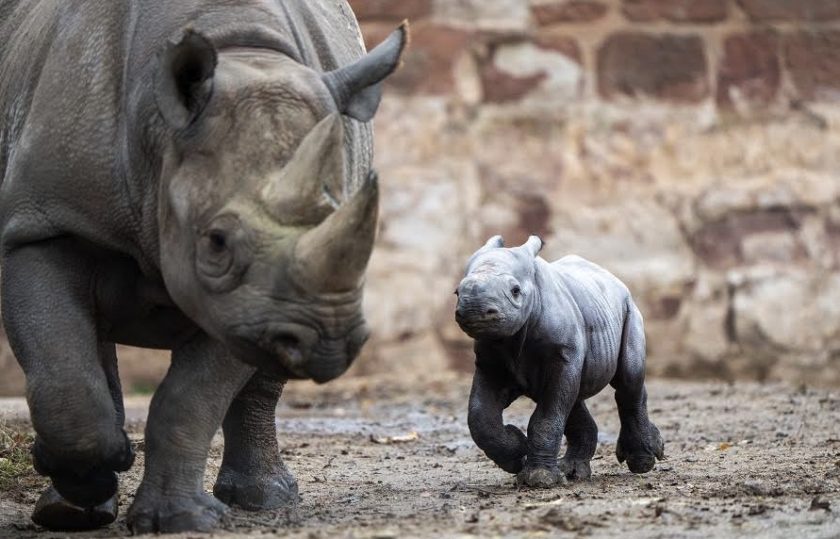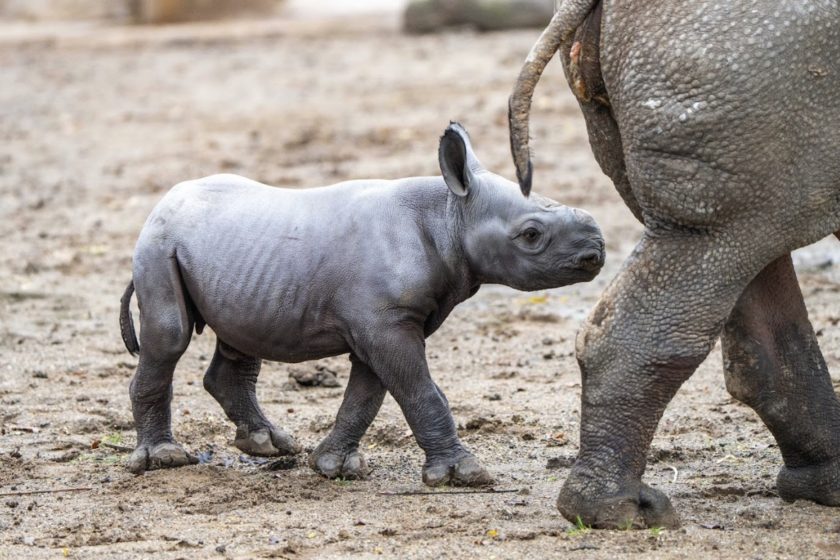Chester Zoo captures ‘amazing’ moment critically endangered eastern black rhino calf is born

In an event described as “amazing” by zookeepers, Chester Zoo has successfully filmed the birth of a critically endangered eastern black rhino calf. The heartwarming footage captures the intimate moments following the calf’s arrival into the world, symbolising a significant stride in wildlife conservation.
The female calf, born to mother Zuri, arrived on a soft sand bed on Sunday 12 November at 2:45 pm, following a 15-month pregnancy. This birth is particularly notable as it occurred during daylight, a rarity for rhinos, allowing zookeepers the unique opportunity to document the occasion.
The early days of the calf’s life, spent bonding with Zuri, have been heartening. The pair are reportedly ‘inseparable’, with the calf showing healthy signs of growth and curiosity, essential for her development.
The eastern black rhino, listed as critically endangered by the International Union for the Conservation of Nature (IUCN), faces a high risk of extinction. With fewer than 600 remaining in the wild across Kenya, Tanzania, and Rwanda, each birth is a critical step towards ensuring the species’ survival.
Zoo conservationists have been actively involved in protecting wild rhinos in Africa. Reports indicate an increase in rhino numbers for the first time in over a decade, highlighting the impact of concerted global conservation efforts.
Rhino Team Manager Emma Evison, who has been closely monitoring mum and calf, said:
“We’d been eagerly awaiting this birth for 15 long months and, as it’s quite unusual for a rhino to give birth in daylight hours, we really didn’t expect it to happen right in front of us as we were going about our day. To be able to witness the calf safely entering the world, in front of our very own eyes, was just the most incredible privilege.
“What’s most important now during these first few days is that mum Zuri and her new baby spend some time bonding and getting to know one another. So far, the pair have been inseparable and the little one is feeding regularly and already gaining in size and weight. She’s very inquisitive and full of energy, which is just brilliant to see.
“Sadly this is a species that, for more than century, has been hunted down and poached for its horn before being sold on the illegal wildlife markets. This precious newborn’s arrival is another positive step in safeguarding the species, which is what the endangered species breeding programme in European conservation zoos that we’re a leading part of is striving to do. This programme has already showed huge success, with a group of rhinos bred in zoo’s in Europe having been translocated to a protected National Park in Africa.”

The illegal wildlife trade – the world’s fourth biggest international crime – is the main driver in thousands of species disappearing from the wild, including the eastern black rhino. The demand for rhino horn, stemming from the traditional Asian medicine market, has seen 95% Africa’s rhinos wiped out by poaching.
However, new figures released this year show that, for the first time in more than a decade, rhino numbers have increased slightly across Africa due to successful conservation efforts.
Mike Jordan, Director of Animals and Plants at the zoo, added:
“Our efforts to protect this magnificent species extend far beyond the zoo’s boundaries and, while it’s incredibly positive news that conservation efforts across Africa have led to a small recovery in rhino numbers, giving them some much needed breathing space, we know there’s still lots of work to be done.

“We’re home to the UK’s only zoo-based animal endocrine lab where we’ve developed the skills and techniques to track rhino hormones by closely analysing their dung. This has helped us to massively improve the chances of a successful mating and further increase numbers of this critically endangered species. The technology is so precise that we’re now transferring it to a specialist lab in Kenya which is helping rangers and vets there to support growth of the wild population.
“Zuri and her new arrival is testament to the unwavering dedication of conservationists here at Chester, and around the world, who are working to safeguard these incredible animals and ensure that they thrive long into the future.”
In June 2019 the zoo also spearheaded a project that saw a group of Eastern black rhinos, bred as part of the safety-net population in European zoos, translocated from Europe to Akagera national Park in Rwanda, Africa.
Latest News









